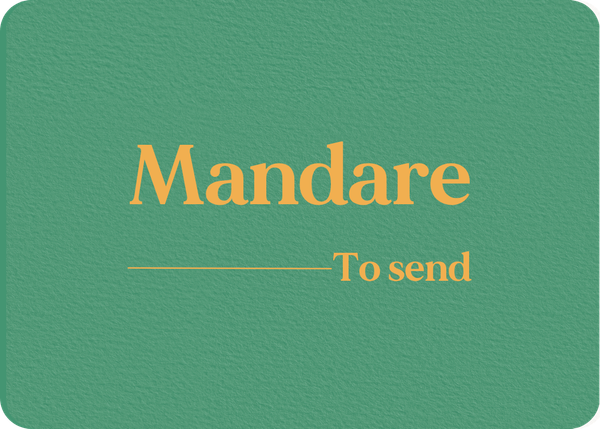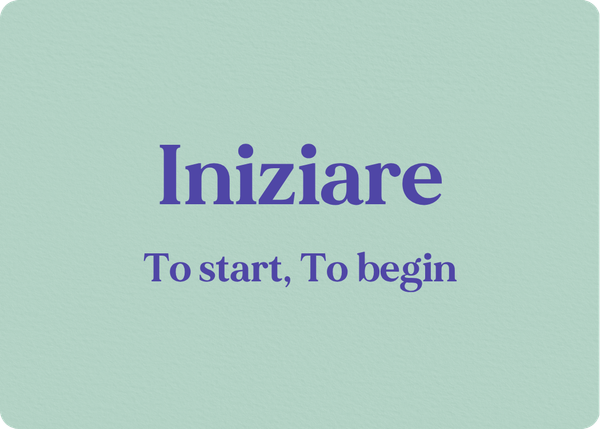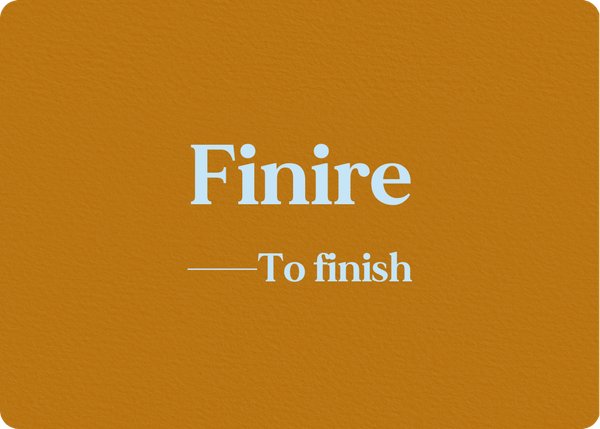What is Mandare?
Mandare is an Italian verb meaning "to send", "to dispatch", or "to mail". It belongs to the first conjugation (-ARE verbs) and follows regular conjugation patterns. This verb is useful for everyday Italian conversation, from describing sending letters and packages to expressing dispatching people and messages.
Key Features of Mandare:
- Type: Regular first conjugation verb (-ARE)
- Meaning: To send, to dispatch, to mail, to ship
- Auxiliary verb: Uses "avere" (to have) for conjugation in compound tenses
- Past participle: Mandato
Indicativo – Indicative Mood
Presente (Present Tense)
| Persona | Coniugazione |
|---|---|
| io | mando |
| tu | mandi |
| lui/lei | manda |
| noi | mandiamo |
| voi | mandate |
| loro | mandano |
Example:
Alessandro e Maura mandano sempre cartoline quando sono in vacanza.
Alessandro and Maura always send postcards when they're on vacation.
Passato Prossimo (Present Perfect)
| Persona | Coniugazione |
|---|---|
| io | ho mandato |
| tu | hai mandato |
| lui/lei | ha mandato |
| noi | abbiamo mandato |
| voi | avete mandato |
| loro | hanno mandato |
Example:
Hai mandato il curriculum all'azienda?
Did you send your resume to the company?
Imperfetto (Imperfect)
| Persona | Coniugazione |
|---|---|
| io | mandavo |
| tu | mandavi |
| lui/lei | mandava |
| noi | mandavamo |
| voi | mandavate |
| loro | mandavano |
Example:
Da giovane mandavo lettere d'amore.
When I was young I used to send love letters.
Trapassato Prossimo (Past Perfect)
| Persona | Coniugazione |
|---|---|
| io | avevo mandato |
| tu | avevi mandato |
| lui/lei | aveva mandato |
| noi | avevamo mandato |
| voi | avevate mandato |
| loro | avevano mandato |
Example:
Quando sono arrivata, Matteo aveva già mandato i bambini a letto.
When I arrived, Matteo had already sent the children to bed.
Passato Remoto (Simple Past)
| Persona | Coniugazione |
|---|---|
| io | mandai |
| tu | mandasti |
| lui/lei | mandò |
| noi | mandammo |
| voi | mandaste |
| loro | mandarono |
Example:
Quel giorno mandarono via tutti senza spiegazioni.
That day they sent everyone away without explanations.
Trapassato Remoto (Past Anterior)
| Persona | Coniugazione |
|---|---|
| io | ebbi mandato |
| tu | avesti mandato |
| lui/lei | ebbe mandato |
| noi | avemmo mandato |
| voi | aveste mandato |
| loro | ebbero mandato |
Example:
Non appena ebbi mandato la prenotazione online, ricevetti la conferma.
As soon as I had sent the online booking, I received confirmation.
Futuro Semplice (Simple Future)
| Persona | Coniugazione |
|---|---|
| io | manderò |
| tu | manderai |
| lui/lei | manderà |
| noi | manderemo |
| voi | manderete |
| loro | manderanno |
Example:
Ti manderò le foto domani.
I will send you the photos tomorrow.
Futuro Anteriore (Future Perfect)
| Persona | Coniugazione |
|---|---|
| io | avrò mandato |
| tu | avrai mandato |
| lui/lei | avrà mandato |
| noi | avremo mandato |
| voi | avrete mandato |
| loro | avranno mandato |
Example:
Entro lunedì avremo mandato la proposta al cliente.
By Monday we will have sent the proposal to the client.
Congiuntivo – Subjunctive Mood
Presente (Present Subjunctive)
| Persona | Coniugazione |
|---|---|
| che io | mandi |
| che tu | mandi |
| che lui/lei | mandi |
| che noi | mandiamo |
| che voi | mandiate |
| che loro | mandino |
Example:
Esigo che mandiate una e-mail di scuse al cliente.
I insist that you send an apology email to the customer.
Passato (Past Subjunctive)
| Persona | Coniugazione |
|---|---|
| che io | abbia mandato |
| che tu | abbia mandato |
| che lui/lei | abbia mandato |
| che noi | abbiamo mandato |
| che voi | abbiate mandato |
| che loro | abbiano mandato |
Example:
Temo che non abbia mandato i documenti in tempo.
I fear he/she didn't send the documents on time.
Imperfetto (Imperfect Subjunctive)
| Persona | Coniugazione |
|---|---|
| che io | mandassi |
| che tu | mandassi |
| che lui/lei | mandasse |
| che noi | mandassimo |
| che voi | mandaste |
| che loro | mandassero |
Example:
Sarei felice se mi mandassi alcune foto del tuo viaggio in Andalusia.
I’d be happy if you sent me some photos from your trip to Andalusia.
Trapassato (Past Perfect Subjunctive)
| Persona | Coniugazione |
|---|---|
| che io | avessi mandato |
| che tu | avessi mandato |
| che lui/lei | avesse mandato |
| che noi | avessimo mandato |
| che voi | aveste mandato |
| che loro | avessero mandato |
Example:
Se mi avessi mandato un messaggio, non ti avrei aspettato per ore.
If you had sent me a message, I wouldn’t have waited for you for hours.
Condizionale – Conditional Mood
Presente (Present Conditional)
| Persona | Coniugazione |
|---|---|
| io | manderei |
| tu | manderesti |
| lui/lei | manderebbe |
| noi | manderemmo |
| voi | mandereste |
| loro | manderebbero |
Example:
Mi manderesti una foto del vestito?
Could you send me a pic of the dress?
Passato (Past Conditional)
| Persona | Coniugazione |
|---|---|
| io | avrei mandato |
| tu | avresti mandato |
| lui/lei | avrebbe mandato |
| noi | avremmo mandato |
| voi | avreste mandato |
| loro | avrebbero mandato |
Example:
Avremmo mandato i bambini al campo estivo, se ci fossero stati ancora posti disponibili.
We would’ve sent the kids to summer camp if there had still been spots available.
Imperativo (Imperative)
| Persona | Coniugazione |
|---|---|
| (tu) | manda |
| (lui/lei) | mandi |
| (noi) | mandiamo |
| (voi) | mandate |
| (loro) | mandino |
Example:
Mandi conferma della sua partecipazione entro stasera, per favore!
Please send confirmation of your participation by tonight!
Indefinite Moods
Infinito (Infinitive)
- Presente (Present): mandare (to send)
- Passato (Past): avere mandato (to have sent)
Examples:
Dobbiamo mandare gli auguri a Carla, oggi è il suo compleanno!
We have to send wishes to Carla, today is her birthday!
Credo di aver(e) mandato il messaggio alla persona sbagliata.
I believe I sent the message to the wrong person.
Participio (Participle)
- Presente (Present): mandante (sending) - rarely used except as noun meaning "sender/instigator"
- Passato (Past): mandato (sent)
Examples:
Il mandante del crimine fu arrestato.
The instigator of the crime was arrested.
Abbiamo mandato gli inviti per la festa.
We sent the invitations for the party.
Gerundio (Gerund)
- Presente (Present): mandando (sending)
- Passato (Past): avendo mandato (having sent)
Examples:
Mandando subito le scuse, risolverai la questione.
Sending your apology right away will fix the problem.
Avendo mandato i documenti in ritardo, ho perso l'opportunità.
Having sent the documents late, I missed the opportunity.
The verb Mandare at a glance: Key tenses you need
| Present | Present Perfect | Imperfect | Present Subjunctive | Imperfect Subjunctive | Present Conditional |
|---|---|---|---|---|---|
| io mando | io ho mandato | io mandavo | che io mandi | che io mandassi | io manderei |
| tu mandi | tu hai mandato | tu mandavi | che tu mandi | che tu mandassi | tu manderesti |
| lui/lei manda | lui/lei ha mandato | lui/lei mandava | che lui/lei mandi | che lui/lei mandasse | lui/lei manderebbe |
| noi mandiamo | noi abbiamo mandato | noi mandavamo | che noi mandiamo | che noi mandassimo | noi manderemmo |
| voi mandate | voi avete mandato | voi mandavate | che voi mandiate | che voi mandaste | voi mandereste |
| loro mandano | loro hanno mandato | loro mandavano | che loro mandino | che loro mandassero | loro manderebbero |
Conclusion
Mastering the conjugation of "mandare" is useful for expressing sending, dispatching, and mailing in Italian. As a regular first conjugation verb, it follows standard patterns throughout all tenses.
Remember the key points:
- Uses "avere" as auxiliary verb in compound tenses
- Regular first conjugation verb (-ARE) with standard patterns throughout all tenses
- Past participle is "mandato"
- Essential for describing sending letters, emails, packages, and messages
Keep practicing with real sentences and contextual examples to master this Italian verb!





